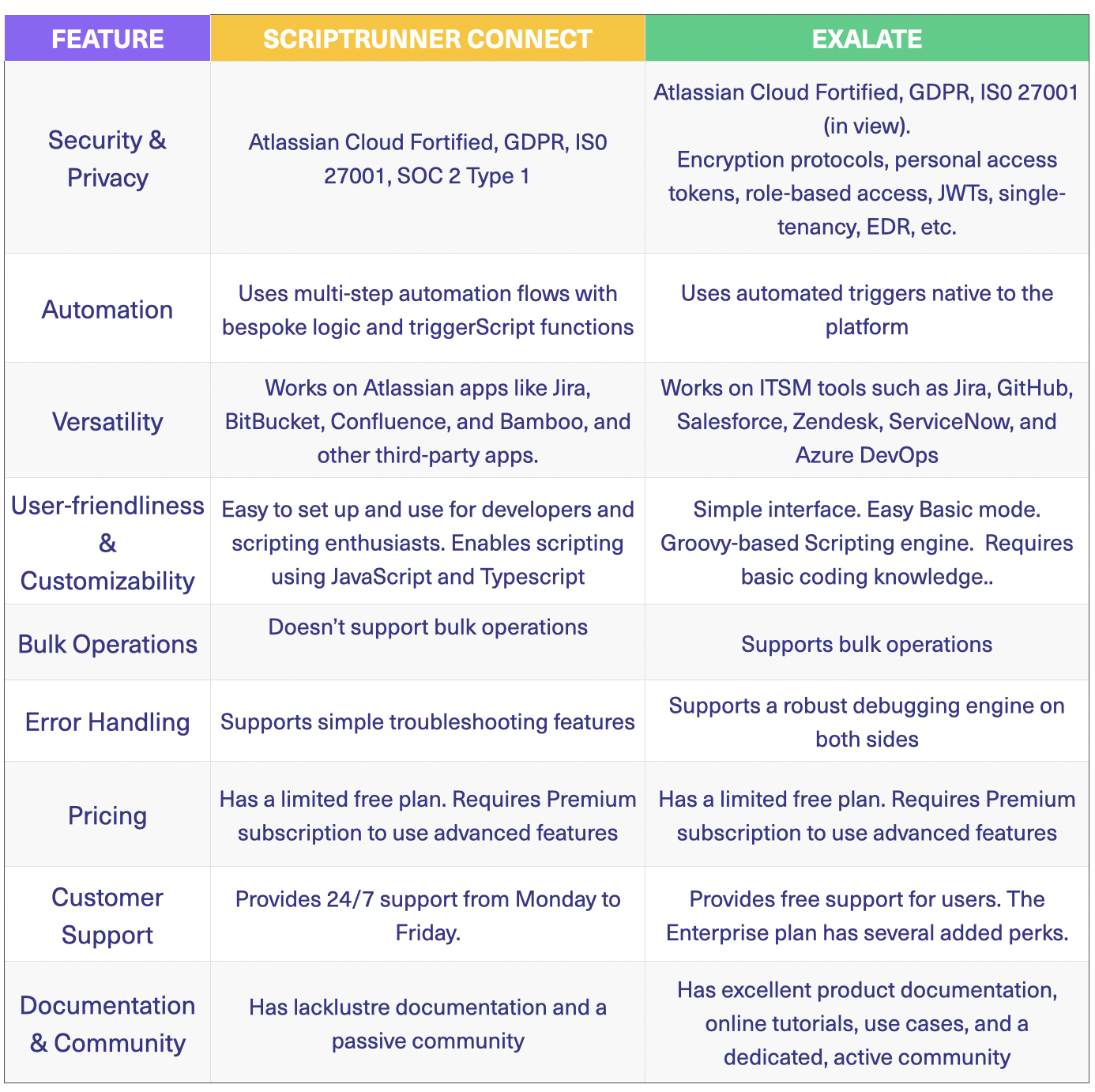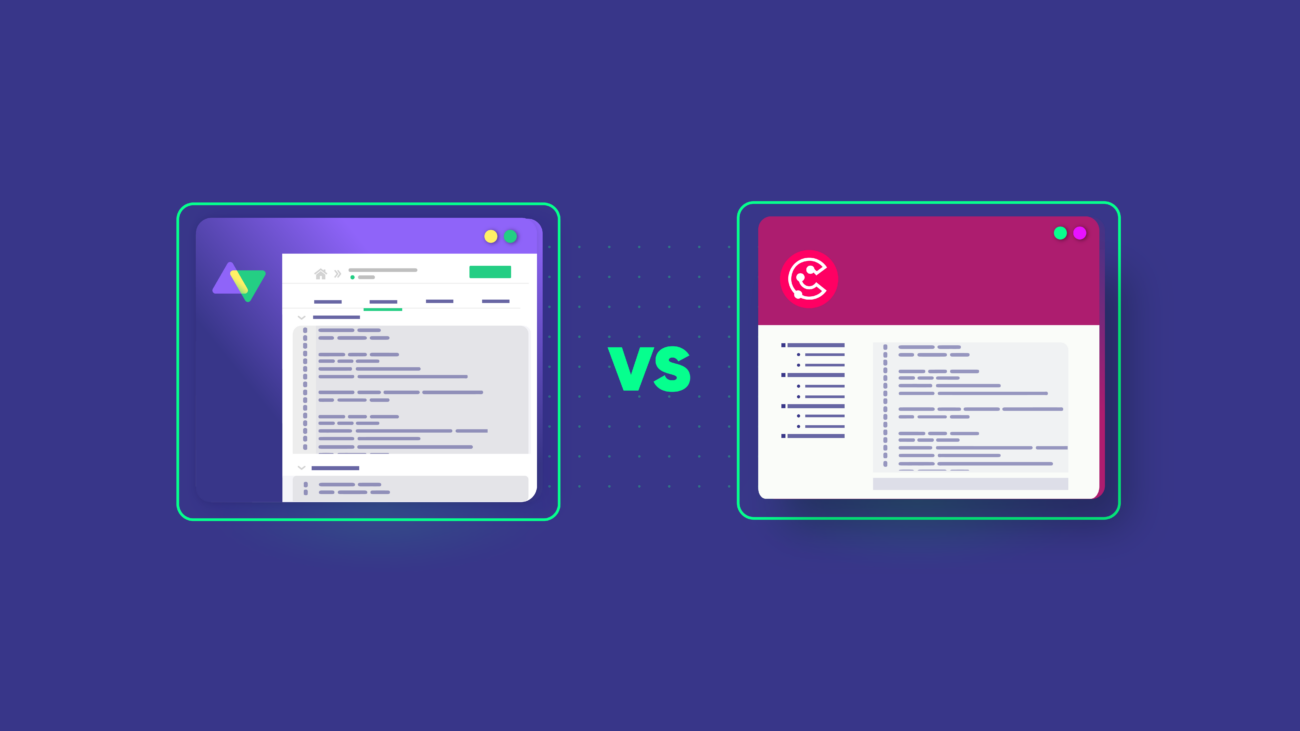Jira users often want to share data with other team members, usually across two Jira platforms or with other third-party apps. To guarantee the smooth and safe transmission of data, you need a secure Jira integration solution.
If the option is between Adaptavist ScriptRunner Connect and Exalate, you need to compare their features to figure out which suits your use case best.
In this guide, I’ll evaluate Adaptavist ScriptRunner Connect and Exalate to find out how they compare in terms of security and other factors.
Jump to:
- What is Adaptavist ScriptRunner Connect?
- What is Exalate?
- ScriptRunner Connect vs. Exalate: Comparing Key Features and Attributes
- Exalate or Adaptavist ScriptRunner Connect: Making Your Final Pick
What is Adaptavist ScriptRunner Connect?
Adaptavist ScriptRunner Connect is a code-first integration tool that allows you to integrate businesses across Atlassian and third-party apps.

This integration solution provides multiple connectors for different integration scenarios.
What is Exalate?
Exalate is a bi-directional integration solution that enables you to sync data between Jira and other work management systems like ServiceNow, GitHub, Salesforce, and more.
Exalate is a decentralized integration tool that allows you to configure and automate syncs using custom scripts and triggers, without having to give up full control over your data.
ScriptRunner Connect vs. Exalate: Comparing Key Features and Attributes
To determine how ScriptRunner Connect stacks up against Exalate, let’s answer the following questions.
Is it easy to configure?
ScriptRunner Connect comes with several templates containing ready-made scripts. You can find these custom and user-generated templates in the ScriptRunner Library.
If you have development experience, you can configure the listeners using webhooks in order to detect issue creation and update changes.
Even though you don’t need to install ScriptRunner on your local instance, setting up two-way syncs for various fields is time-consuming and confusing because you need to set up listeners on both the source and destination.
Exalate users can install their instance from the Jira Marketplace and complete the Basic Mode configuration in a few clicks. Developers and scripting enthusiasts can also explore Exalate’s Script Mode for advanced synchronization scenarios.
Setting up two-way syncs with Exalate is easy. You only need to initiate the connection from one end (the local instance), and the other side (the remote instance) has to accept the invitation.
How does it handle errors?
ScriptRunner Connect has an impressive IDE, but troubleshooting is difficult. Even though you can see error messages, the compiler doesn’t give you exact timestamps — which adds to the pain of debugging faulty connections.
Apart from that, you can’t pause or deactivate a connection to limit the damage without having to delete the connection completely.
But one good thing about ScriptRunner for Jira is that you can switch environments between development and production in order to test the script. This “dry run” capability is a massive win because it helps you test-drive your sync before deploying it.
Exalate’s error-handling mechanism is more robust. It shows you the source of the error as well as the exact timestamp. This feature makes it possible to fix wrong expressions, class definitions, etc., before they can block the sync.
In addition, Exalate provides an option to deactivate connections. This feature allows users to stop and debug a malfunctioning sync without deleting it completely and losing the entire flow.
Is it fully customizable?
Exalate comes with a Groovy scripting engine that you can infinitely configure for several use cases and integration scenarios. You can write custom rules for syncing different entities and fields. For example, you can configure ScriptRunner listeners to control “Exalated” entities.
The ScriptRunner script editor uses a JavaScript/Typescript engine to control every aspect of your instance via the Java API and REST API. This makes it possible to configure connections using a ScriptRunner function in order to display custom messages and accept UI changes.
Although both solutions can sync custom fields, ScriptRunner only supports configurations using the custom field ID, not the name.
Can I automate syncs?
Adaptavist ScriptRunner Connect allows users to build multi-step automation flows with bespoke logic, loops, variables, and triggerScript functions. This makes it possible to archive issues, update and validate custom fields across projects, and remove repetitive tasks.
Exalate handles automation using sync triggers, which outline the conditions for connections. These triggers use the Jira Query Language (JQL).
You can create multiple triggers for handling entities and connections in bulk. The Bulk Exalate option automatically syncs and updates all un-synced entities with similar trigger search queries. The Bulk Connect option allows you to sync multiple entities in one click.
How does it handle security?
ScriptRunner Connect is Atlassian Cloud Fortified and compliant with GDPR guidelines. It also has ISO 20071 and SOC 2 Type 1 security certifications.
Exalate secures data transmission using protocols such as HTTPS, 256-bit AES/CBC, TLS 1.3, TLS 1.2, SFTP, and FTPS. This solution also relies on security features such as JSON Web Tokens (JWT), personal access tokens, and OAuth authentication to verify users. It is ISO 27001 certified.
In addition, Exalate uses advanced endpoint detection and response (EDR) to respond to suspicious activity. And most importantly, Exalate rests on a single-tenant architecture, which means it is secure by design.
How good is the documentation?
Exalate’s comprehensive documentation provides detailed information about setting up connections and script snippets for different platforms.
New users can follow the Getting Started guide to start setting up Exalate with little or no expert help. You can also visit the Exalate Academy to access a treasure trove of video tutorials and use cases.
Exalate has an active community where you can connect with other users and technical engineers for user-generated solutions to common problems.
The ScriptRunner Connect documentation page is fairly usable. With a bit of tweaking, navigating the documentation would become a lot easier. For now, finding information on the page feels like a massive chore.
But what Adaptavist ScriptRunner lacks in documentation, it makes up for with its library. The Adaptavist Library is stacked to the brim with scripts for different Jira platforms, products, and third-party apps.
How many integration scenarios does it support?
Adaptavist ScriptRunner Connect allows you to move data between tools within the Atlassian stack and other external apps, such as:
- Atlassian apps — Confluence, Bamboo, Bitbucket, Jira (Cloud, On-Premise, Service Management Cloud)
- 3rd party solutions — Slack, Salesforce, Statuspage, ServiceNow, Microsoft Teams, Tempo Cloud, GitHub, Trello, and Zoom.
Exalate supports connections to multiple Jira instances at once. It also supports permutated connections between Jira, GitHub, Zendesk, ServiceNow, Azure DevOps, and Salesforce.
How good is the support?
As an Exalate customer, you get free support, which includes onboarding calls. The Enterprise plan gives you access to solution assistance, bi-weekly sync meetings, and other perks. You can get in touch with technical engineers by dropping a message in the support portal.
Adaptavist ScriptRunner support works around the clock, from Monday to Friday — no support on the weekends. You can contact them by submitting a support ticket.
How much does it cost?
ScriptRunner Connect is free to download and set up from the Atlassian Marketplace. To find out more about the ScriptRunner pricing, you need to contact the internal team and book a demo with them.:
Exalate’s Free plan gives you up to 1,000 new entity twin pairs per month. This package includes pre-built Basic Mode configurations for low-complexity use cases.
Exalate’s Premium plan gives you access to unlimited custom two-way syncs. You can start with the 30-day free trial before opting for the Jira Premium Plan for a starting price of $6 per user/month. You can find out more about Exalate’s pricing here.
Exalate or Adaptavist ScriptRunner Connect: Making Your Final Pick

If you want to connect with Atlassian apps such as Confluence or BitBucket, then ScriptRunner Connect is the perfect solution. If you want to sync data with Jira, Salesforce, GitHub, Zendesk, ServiceNow, and Azure DevOps, Exalate is the go-to option.
Both solutions support advanced scripting and automation. But if you want granular control over your syncs, Exalate is the best bet because it supports JQL triggers.
Both Exalate and Adaptavist ScriptRunner Connect have free plans, but you need to get Exalate Premium to have fun with advanced scripting.
Want to connect your Jira with other ITSM tools and fully customize your sync using custom scripts? Book a free call with an integration engineer and bring your specific use case to the session.
Recommended Reading:




